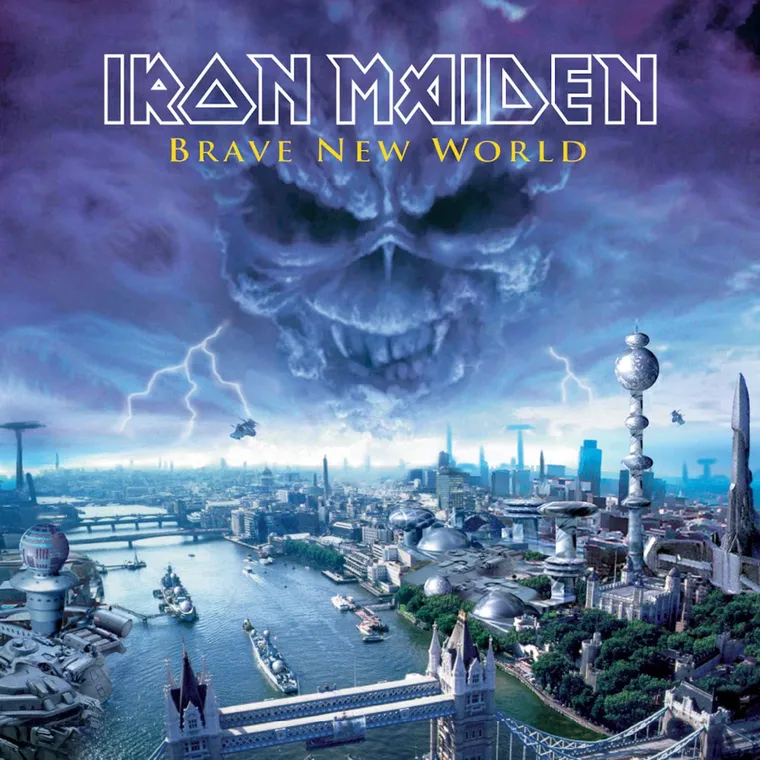May 29, 2000, Brave New World marked the rebirth of Iron Maiden—not a reboot, not a throwback, but a thunderous second act that proved legends could not only return but also ascend. With Bruce Dickinson and Adrian Smith back in the fold, the classic six-piece lineup emerged from the turn-of-the-century fog like a warhorse charging once more into battle. The result wasn’t nostalgia. It was prophecy fulfilled.
Iron Maiden didn’t merely pick up where they left off—they leveled up. Brave New World is not a swan song or a desperate comeback. It is a manifesto of purpose, a grand, cinematic reaffirmation of everything Maiden was, is, and could become. It fused the fearless storytelling of Seventh Son with the maturity of seasoned warriors—and it thundered into the new millennium with gallop, grit, and grandeur.
Six Strings of Destiny
From the opening harmonies of “The Wicker Man,” it’s immediately clear that this is a rejuvenated beast. The track roars to life with swagger and speed, as Dickinson belts out one of his most triumphant choruses in decades. “Your time will come,” he howls—not as a warning, but as a rallying cry. Maiden is back, and they’re not asking permission.
The addition of a third guitarist—Janick Gers joining Smith and Murray—could have been a cluttered experiment. Instead, it unlocks a new dimension. The riffs are layered, textured, and often harmonized in ways that feel like orchestral movements more than metal licks. The solos soar like fighter planes, looping and diving across vast melodic skies.
On “Ghost of the Navigator,” the band flexes their narrative muscles, with tempo shifts that mimic the rise and fall of oceanic adventure. “Blood Brothers” follows, a rare moment of tenderness from Steve Harris that turns into one of the album’s most anthemic, emotionally resonant refrains. It’s reflective, unafraid to embrace vulnerability amid the marching drums and skybound leads.
Lyrical Lore and Apocalyptic Hymns
If Maiden’s early work flirted with epic poetry, Brave New World dives headlong into it. This album doesn’t just tell stories—it builds worlds. The title track paints a vision of dystopia through utopian eyes, a society blind to its own decay. It’s not pessimistic; it’s prophetic. With themes pulled from Aldous Huxley and echoes of Orwell, it’s both literary and electric.
“The Mercenary” and “The Fallen Angel” keep the pace fast and sharp, reminding fans that even as they embrace longer compositions and philosophical weight, Maiden can still rip. But it’s in the seven- and nine-minute journeys—“Dream of Mirrors,” “The Nomad,” and “Out of the Silent Planet”—that the band truly shines. These aren’t bloated prog experiments; they’re structured sagas, shifting between moods like acts in a play.
Dickinson’s voice is a miracle. Time hasn’t dulled its edge; it’s only made it wiser, deeper, more controlled. Whether wailing high over choruses or slipping into near-whispered verses, he commands the narrative with the confidence of a battle-scarred bard.
The Sound of Resurrection
Produced by Kevin Shirley, the album straddles analog warmth and modern clarity. It doesn’t sound retro—it sounds timeless. Nicko McBrain’s drumming is thunderous but disciplined, never overstepping but always anchoring. Steve Harris, as always, writes basslines like blueprints—foundational, technical, and full of movement. The guitar mix allows each lead to speak without crowding, giving the triple-guitar format surprising cohesion.
Unlike some reunion albums that lean on old tricks, Brave New World feels forward-looking. It’s as much about the future as it is about the past. There’s a certain elegance in the pacing, a grandeur in the arrangements, and a refusal to compromise. It’s the sound of a band not chasing youth but redefining maturity on their own terms.
Standout Tracks:
- The Wicker Man
- Ghost of the Navigator
- Blood Brothers
- Dream of Mirrors
- Brave New World
- The Nomad
- Out of the Silent Planet
Legacy Reforged
Brave New World is more than just a great Iron Maiden album—it’s one of their most important. It doesn’t merely prove they still had gas in the tank; it shows they had entire galaxies yet to explore. While earlier works like The Number of the Beast and Powerslave laid the foundation, Brave New World is the cathedral built atop it—stained glass, flying buttresses, and all.
This is the sound of a band standing on the ruins of the 20th century and declaring dominion over the next. It’s confident but never arrogant. Epic but never indulgent. Heavy but always human.
In a genre where age often spells irrelevance, Iron Maiden forged their second prime—and Brave New World is its battle standard.

